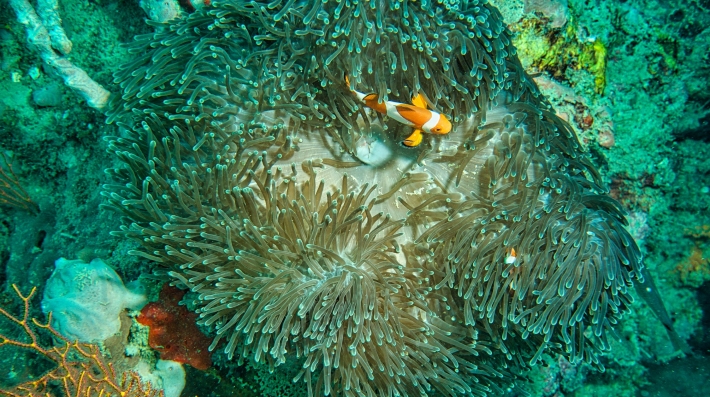Recreate, Re-imagine, Restore! UN Decade on Ecosystem Restoration kicks off
Rome:Leaders in global politics, science, communities, religion and culture joined hands today to officially kick off the UN Decade on Ecosystem Restoration – a rallying call for the protection and revival of millions of hectares of ecosystems all around the world for the benefit of people and nature.
Led by the UN Environment Programme (UNEP) and the Food and Agriculture Organization of the UN (FAO), the Decade on Restoration – which runs from 2021 to 2030 – was proclaimed by the United Nations General Assembly in a 2019 resolution.
The launch took the form of a high-level virtual gala with the participation, alongside the heads of UNEP and FAO and UN Secretary-General António Guterres, of Imran Khan, the Prime Minister of Pakistan, which hosts World Environment Day on 5 June this year; Pope Francis; Félix-Antoine Tshisekedi Tshilombo, President of the Democratic Republic of Congo and Chair of the African Union; German Chancellor Angela Merkel; and Prime Minister of Barbados, Mia Mottley. Among the global figures who spoke were UN Messenger of Peace Jane Goodall and other goodwill ambassadors, advocates, youth representatives, scientists and CEOs.
“By restoring ecosystems, we can drive a transformation that will contribute to the achievement of all the Sustainable Development Goals. The task is monumental. We need to replant and protect our forests. We need to clean up our rivers and seas. And we need to green our cities,” the UN Secretary-General said in his message. “Accomplishing these things will not only safeguard the planet’s resources. It will create millions of new jobs by 2030, generate returns of over $7 trillion dollars every year and help eliminate poverty and hunger.”
The FAO Director-General QU Dongyu, noting that the increasing pressure on the world’s natural resources is affecting the well-being of 40 percent of the global population, called for a change of mindset.
“Business as usual is not an option!” he underscored. “We need to prevent, halt and reverse the degradation of ecosystems worldwide, including our farmlands and forests; our rivers and oceans. More efficient, inclusive, resilient and sustainable agri-food systems can help restore ecosystems and safeguard sustainable food production, leaving no one behind,” he added.
“We must use this moment in history to launch a massive global movement to save our terrestrial and marine ecosystems even as we continue to decarbonize. Everyone has a ‘to-do’ here,” said UNEP Executive Director Inger Andersen. “Governments must ensure COVID-19 stimulus packages contribute to a sustainable and equitable recovery from the pandemic. Businesses and the financial sector must reform operations and financial flows so that they restore the natural world. And as individuals and consumers, it is time rethink choices, demand deforestation-free products and vote for sustainability in the polling booths.”
“Restoring the nature we have damaged means, in the first place, restoring ourselves,” said Pope Francis in a video message relayed by Cardinal Pietro Parolin, Secretary of State. “We welcome this United Nations Decade on Ecosystem Restoration, let us be compassionate, creative and courageous. May we take our proper place as a ‘Restoration Generation.’”
The Decade aims to inspire and support governments, multilateral organizations, civil society, private sector companies, youth, women’s groups, indigenous peoples, farmers, local communities and individuals globally, to collaborate, develop and catalyse restoration initiatives across the world. The effort will involve a raft of activities. They range from redirecting fiscal incentives and financial flows to promote restoration to undertaking research on restoration in terrestrial and marine environments, building the technical capacity of restoration practitioners globally and monitoring global progress on restoration.
The Decade aims to mobilize hundreds of millions of people to restore nature and foster a global restoration culture in which restoration initiatives are scaled up across the planet.
“The world has no choice but to go on a nature positive pathway which will not only boost the economy but also protect the environment,“ said Imran Khan, Prime Minister of Pakistan, whose country in 2019 embarked on an ambitious plan to plant 10 billion trees.
Welcoming the launch of the UN Decade, Felix-Antoine Tshisekedi Tshilombo, President of the Democratic Republic of Congo and Chair of the African Union, noted that the African continent had made multiple commitments through several regional Declarations, pledges, Calls to Action and pilot activities, but there was a need to mobilize the necessary resources and expertise to lead large-scale implementation.
“The restoration of terrestrial, marine and freshwater ecosystems should be undertaken in such a way as to avoid creating land conflicts or conflicts of use,” he added. “It must therefore be part of visionary spatial planning processes that take into account inter-sectoral trade-offs, respecting land and resource tenure rights of local communities and other vulnerable social groups.”
In her message, German Chancellor Angela Merkel said: “We have to do more to protect and restore natural habitats – and we have to do it now, not some time in the future.”
“We have to ensure now that forests, which we need not least to regulate our climate, are protected and replenished,” she added.
The Chancellor also announced that Germany would be the first country to provide funding – 14 million Euro – to the Multi-Partner Trust Fund for the Decade on Ecosystem Restoration.
The launch of the Decade on Ecosystem Restoration today leads into World Environment Day on 5 June, the United Nations’ flagship day for promoting worldwide awareness and action for the environment. Held under the theme of ecosystem restoration, this year’s World Environment Day is hosted by Pakistan, which will mark the day and the start of the UN Decade with an event taking place in Islamabad and officiated by Prime Minister Imran Khan with the participation from a host of dignitaries from around the world including UNEP Executive Director Inger Andersen and senior officials from FAO, UN-Habitat and UNDP, as well as senior officials from countries including Germany and Saudi Arabia.

